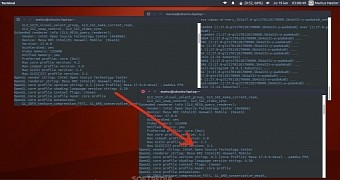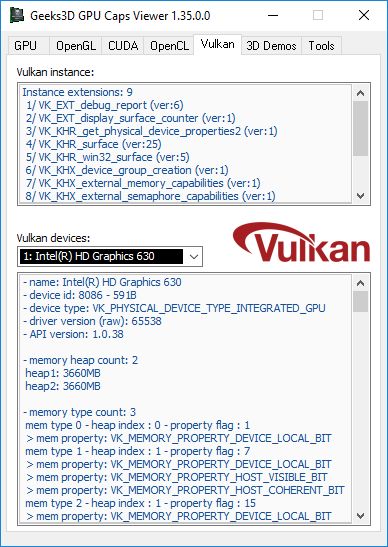
- #OPENGL EXTENSIONS VIEWER TO DETERMINE VULKAN SUPPORT INSTALL#
- #OPENGL EXTENSIONS VIEWER TO DETERMINE VULKAN SUPPORT DRIVER#
- #OPENGL EXTENSIONS VIEWER TO DETERMINE VULKAN SUPPORT FULL#
utilization - OpenGL ES GPU details, real-time GPU clock measurement - Vulkan, OpenCL, CUDA.
#OPENGL EXTENSIONS VIEWER TO DETERMINE VULKAN SUPPORT DRIVER#
I’ve got this note: the vulkan driver for Intet(R) UHD Graphics 620 reports that it only supports Vulkan version 0.16. may tell you information about the driver you are interested in. Check the OpenGL version of the GPU: Example. The sources for project are open source and hosted at github. I want to check if Vulkan support exists, if not then if GL support exists and if not that then crash.

#OPENGL EXTENSIONS VIEWER TO DETERMINE VULKAN SUPPORT INSTALL#
The latest binaries for Windows and Linux can be found at. Download and install OpenGL Extensions Viewer (free of charge). check what has changed between two driver versions or how two graphics cards differ in terms of their OpenGL implementation. The database itself allows for advanced searches (extensions, compressed texture formats, capabilities), and can compare different device reports, so you can e.g. Similarly, all physical device features required must be specified while creating a vkDevice. Here is a screenshot from an example app in the Vulkan Samples repository which uses OpenGL to render a simple shadertoy to a texture, and then uses that texture in a Vulkan rendered window. In Vulkan, while creating a vkInstance or a vkDevice all extensions that will be used must be specified to be enabled during instance/device creation. DatabaseĪlong with the client-side application, there is also an online database containing all OpenGL hardware reports uploaded by users of this application. Yes, its possible if the Vulkan implementation and the OpenGL implementation both have the appropriate extensions available.
#OPENGL EXTENSIONS VIEWER TO DETERMINE VULKAN SUPPORT FULL#
New DCA decoder based on libdcadec with full support for DTS-HD extensions.

The early versions of this tool were developed using Delphi / Free Pascal, but the project has since then been redone in C++ is available for multiple platforms. Both the ffplay and opengl output devices have been updated to support SDL2.

The “OpenGL hardware capability viewer” (short “glCapsViewer) a multi-platform client-side application that reads out all important hardware capabilities of the current OpenGL-implementation present on your system (currently up to OpenGL 4.5), that can then be uploaded to a public database, serving as a tool for OpenGL developers.


 0 kommentar(er)
0 kommentar(er)
